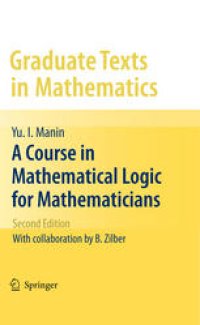
Ebook: A Course In Mathematical Logic For Mathematicians
Author: Yu. I. Manin (auth.)
- Genre: Mathematics // Logic
- Tags: Mathematical Logic and Foundations, Logic
- Series: Graduate Texts in Mathematics 53
- Year: 2010
- Publisher: Springer-Verlag New York
- Edition: 2
- Language: English
- pdf
A Course in Mathematical Logic for Mathematicians, Second Edition offers a straightforward introduction to modern mathematical logic that will appeal to the intuition of working mathematicians. The book begins with an elementary introduction to formal languages and proceeds to a discussion of proof theory. It then presents several highlights of 20th century mathematical logic, including theorems of Gödel and Tarski, and Cohen's theorem on the independence of the continuum hypothesis. A unique feature of the text is a discussion of quantum logic.
The exposition then moves to a discussion of computability theory that is based on the notion of recursive functions and stresses number-theoretic connections. The text present a complete proof of the theorem of Davis–Putnam–Robinson–Matiyasevich as well as a proof of Higman's theorem on recursive groups. Kolmogorov complexity is also treated.
Part III establishes the essential equivalence of proof theory and computation theory and gives applications such as Gödel's theorem on the length of proofs. A new Chapter IX, written by Yuri Manin, treats, among other things, a categorical approach to the theory of computation, quantum computation, and the P/NP problem. A new Chapter X, written by Boris Zilber, contains basic results of model theory and its applications to mainstream mathematics. This theory has found deep applications in algebraic and diophantine geometry.
Yuri Ivanovich Manin is Professor Emeritus at Max-Planck-Institute for Mathematics in Bonn, Germany, Board of Trustees Professor at the Northwestern University, Evanston, IL, USA, and Principal Researcher at the Steklov Institute of Mathematics, Moscow, Russia. Boris Zilber, Professor of Mathematical Logic at the University of Oxford, has contributed the Model Theory Chapter for the second edition.